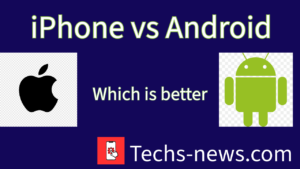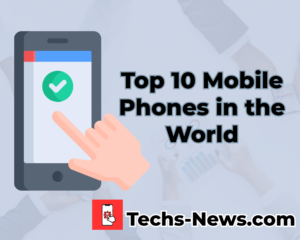
iPhone vs. Android: Which Is Better?
iPhone vs. Android: Which Is Better?
When choosing a smartphone, the debate between iPhone and Android is perennial. Both platforms have loyal fan bases, each offering unique features that appeal to different types of users. But which is better, iPhone or Android? This question is complex, as the answer depends on what you prioritize in a smartphone. Let’s delve into the key differences, advantages, and disadvantages of both to help you make an informed decision.
Latest Chromebook Releases: What’s New from HP and Dell in 2024
Which Is Better, Android or iPhone?

The answer to this question largely depends on your preferences and needs. Android offers a more customizable experience, with various devices from manufacturers like Samsung, Google, and OnePlus. On the other hand, the iPhone provides a seamless, user-friendly experience with regular updates, high-quality apps, and a robust ecosystem that integrates well with other Apple products.
What Are the Disadvantages of Android Over iPhone?
- Fragmentation: Android is notorious for fragmentation, where different devices run different operating system versions. This can lead to consistent user experiences and timely software updates.
- Security: Although Android has improved in this area, iPhones are generally considered more secure due to Apple’s strict app store guidelines and regular updates.
- Bloatware: Many Android devices come with pre-installed apps from manufacturers or carriers, which can take up storage space and sometimes cannot be removed.
- App Quality: While Android has a more extensive selection of apps, quality control is often lower than that of iPhone apps. Many developers prioritize iOS, meaning some apps may be optimized better for iPhones.
Are iPhones Better Than Samsung?
iPhones and Samsung phones are often compared due to their status as flagship devices in the smartphone market. Whether an iPhone is better than a Samsung phone depends on what you value most in a device.
- Operating System: iPhones run on iOS, known for its smooth performance, consistent updates, and strong integration with other Apple products. Samsung devices run on Android, which offers more customization options and a broader range of price points.
- Hardware: Samsung tends to push the envelope with hardware, often introducing cutting-edge features before Apple. For instance, Samsung is a leader in display technology, with its Super AMOLED screens, usually considered the best in the market.
- Ecosystem: If you are already invested in the Apple ecosystem, an iPhone might be the better choice due to seamless integration with devices like the iPad, MacBook, and Apple Watch.
Is It Worth Moving From Android to iPhone?
Switching from Android to iPhone can be worth it if you prioritize a streamlined user experience, regular updates, and a secure environment. iPhones are also known for longevity, with many users keeping their devices for several years thanks to ongoing software support. However, sticking with Android might be better if you value customization, a more comprehensive range of hardware options, and the ability to use third-party apps without restrictions.
10 Reasons Why Android Is Better Than iPhone
- Customization: Android offers far more customization options, allowing users to change almost every aspect of their user interface.
- Variety of Devices: Android powers a wide range of devices, from budget phones to premium flagships, offering something for every user.
- Expandable Storage: Many Android devices allow you to expand storage via microSD cards, a feature unavailable on iPhones.
- Google Integration: Android’s integration with Google services is seamless, making it ideal for users who rely heavily on apps like Gmail, Google Drive, and Google Photos.
- Price Flexibility: Android devices are available at a wide range of price points, making them accessible to more people.
- Multi-Window Support: Android supports multitasking, allowing you to run two apps side by side.
- USB Type-C: Most Android phones use USB-C, a universal standard for faster charging and data transfer.
- Custom ROMs: Advanced users can install custom ROMs to change the entire operating system on their Android device.
- Third-Party App Stores: Android allows you to install apps from third-party sources, giving you access to apps unavailable on the Google Play Store.
- Better File Management: Android offers a more traditional file management system, allowing you to manage your files more freely than iOS.
The most significant Difference Between iPhone and Android
The most significant Difference between iPhone and Android lies in the philosophy of their operating systems. iOS is designed to be simple, secure, and user-friendly, with tight control over the ecosystem. On the other hand, Android is built for flexibility and customization, offering a more open experience that allows users to tweak their devices to their liking.
5 Reasons Why iPhone Is Better Than Android
- Seamless Ecosystem: The Apple ecosystem is unparalleled, with devices that work seamlessly together, from iPhone to MacBook to Apple Watch.
- Regular Updates: iPhones receive software updates for several years, ensuring your device stays up-to-date with the latest features and security patches.
- App Quality: Apps on iOS are often better optimized and more polished, with many developers prioritizing the iPhone over Android.
- Resale Value: iPhones tend to hold their value better than Android devices, making them a better long-term investment.
- Security: iPhones are generally more secure, with a tightly controlled app store and features like Face ID that protect your data.
Disadvantages of iPhone Over Android
- Price: iPhones are generally more expensive than Android devices, especially when considering models with more storage.
- Customization: Compared to Android, iOS offers fewer customization options, with fewer ways to personalize the home screen and app experience.
- Limited Hardware Choices: Only a few models are released each year, so iPhone users have less choice in design, size, and features.
- No Expandable Storage: iPhones do not support microSD cards, meaning you’re stuck with the storage you buy.
- Dependency on Apple Ecosystem: While the Apple ecosystem is a strength, it can also be a disadvantage if you want to avoid being locked into Apple’s services and products.
Which Phone Is More User-Friendly, the iPhone or the Android?
The iPhone is generally more user-friendly due to its intuitive design, consistent updates, and seamless integration with other Apple devices. However, Android’s flexibility allows users to tailor their experience, making it user-friendly differently. Ultimately, user-friendliness comes down to personal preference and familiarity with the operating system.
Android vs. iOS: Advantages and Disadvantages
Android Advantages:
- More customization options
- A more comprehensive range of devices at different price points
- Expandable storage
- Better integration with Google services
- More flexibility in file management and app installation
Android Disadvantages:
- Fragmentation and inconsistent updates
- Potential security vulnerabilities
- Pre-installed bloatware
iOS Advantages:
- Seamless integration within the Apple ecosystem
- Regular software updates
- Higher app quality and optimization
- Stronger security
- Better resale value
iOS Disadvantages:
- Higher cost
- Limited customization options
- No expandable storage
- Fewer hardware choices
- Dependency on the Apple ecosystem
Final Thoughts
Choosing between an iPhone and an Android device ultimately comes down to what you value most in a smartphone. Android might be the better choice if you prioritize customization, a broader range of devices, and integration with Google services. However, an iPhone could be the right fit if you prefer a user-friendly experience, robust security, and seamless integration with other Apple products.
Questions & Answers
- Q: Is it worth switching from Android to iPhone?
- A: If you value regular updates and a secure environment and are already invested in the Apple ecosystem, switching to the iPhone could be worth it.
- Q: Are iPhones better than Samsung phones?
- A: It depends on your priorities. iPhones excel in software optimization, ecosystem integration, and security, while Samsung often leads in hardware innovation and display technology.
- Q: What are the main disadvantages of Android over iPhone?
- A: Fragmentation, security concerns, and bloatware are often cited as Android’s main disadvantages compared to iPhone.
Sources
For further reading, you can explore these resources:




